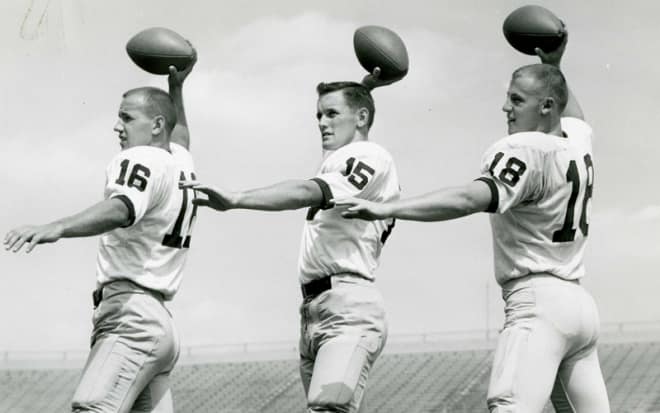Old National presents: A long-awaited spring game return

Bernie Allen hasn’t attended a Purdue spring game since 1957, his freshman year, even though he played — and starred — the next three seasons for the Boilermakers.
The 78-year-old was great on the gridiron in the fall, playing quarterback and defensive back, but in the spring, he wasn’t there. Instead, the East Liverpool, Ohio native was on the diamond, as a standout shortstop for the Boilermakers who then went on to play 12 seasons in the Major Leagues.
So this weekend’s return trip to West Lafayette for the spring game is probably long overdue.
“Yes, it has been a while, like everything I did (there at Purdue),” Allen said while laughing during a phone interview from his Carmel home Wednesday.
Allen, who has been around campus for several events over the years, like the grand opening of Alexander Field (named in honor of his former teammate Dave Alexander), will see a far different football program than his last trip north.
Purdue’s 65-million Football Performance Complex is the biggest change. Allen, and other football alums who will be town for the game, will tour the facility Friday, then have a dinner later that night. Golf for earlier in the day has been cancelled due to the unseasonably cold weather. That’s unfortunate for Allen, who as a student once hit a hole-in-one on the Par 4 first hole on the old South course.
A 1999 inductee into the Purdue Athletics Hall of Fame, Allen, who was a football and baseball MVP as a Boilermaker, then an All-America shortstop in ’61, might get an eye-opener when he checks out the new, sprawling 21,000-square foot weight room.
The players’ space in the late 50s probably wasn’t even a fortieth that size. Buried the basement of Lambert Fieldhouse, in the years before Mackey Arena existed, Purdue had a tiny weight room with some free weights and little else.
“You always had to have a partner with you, but there was only room for about six guys down there at a time,” Allen said, “so you had to work it in between classes or something.”
Of course, Allen wasn’t supposed to be lifting at all. Back in those days, it was frowned upon for baseball players, but of course Allen played both it and football, and for the latter, the 185-pounder needed to be as strong as possible.
So Allen snuck down to the basement in the offseason.
“I figured I could do it in the winter and not tell anybody in baseball,” he said.
So that’s how it went. Allen was recruited to play football for Jack Mollenkopf, but with the promise that he could play for the baseball team, as well. Since freshman weren’t eligible then, Allen participated in his only spring football in ’57, before practicing with the baseball team afterward. But from then on, he was strictly on the baseball field in the spring.
Well, almost strictly.
One season, he tried to do both at the request of Mollenkopf.
“They said they changed the (football) offense,” Allen said, “so they had me take batting and fielding practice, then go change and get on the football gear and go on the other side of the green field and practice football for a while, to learn the new offense. They changed formation but it was the same ‘Hand-the-ball-off’ offense, so it didn’t take me much more than about three days to learn it.
“(Baseball coach) Joe Sexson said, ‘Bernie, it’s time for you to go over,’ and I said, ‘I’m not going.’ He said, ‘Why?’ and I just said that they lied to me. They didn’t change anything. I can still hand it off. And he said, ‘You don’t understand. You’re going to get me fired.’ (Laughing). He said, ‘Don’t you know football runs everything around here?’”
It did. But that didn’t dissuade Allen’s love. He was a baseball player through and through, wanting to pursue it professionally after Purdue. After being drafted by Minnesota in ’61, he played five seasons with the Twins, then five with the Washington Senators and nearly two with the New York Yankees, before Steinbrenner “sold my butt” to Montreal for the final six weeks of the 1973 season. Then, he retired.
Soon after, Allen ran into Mollenkopf at a golf event in Florida — the legendary coach died in ’75 — and the two got to reminiscing. Mollenkopf told Allen that he was his best passer, a compliment, but also one that was a source of feud. Allen had always wanted to throw more, back in that era when 15 passes in a game might have constituted a heavy workload. They had argued much about it in the past, but laughed about it on this occasion.
And they likely remembered all those great wins, too, like in ’60, when Purdue beat No. 12 Notre Dame, No. 2 Ohio State and No. 1 Minnesota.
“We beat some highly ranked teams,” Allen said. “The biggest thrill I got, I’m from Ohio and Woody Hayes had told me I was too small to play Big Ten football and we ended up beating them when they were No. 2. I went looking for him after the game, but he saw me coming and took off. I just wanted to ask him if I was still too small.”

Membership Info: Sign up for GoldandBlack.com now | Why join? | Questions?
Follow GoldandBlack.com: Twitter | Facebook
More: Gold and Black Illustrated/Gold and Black Express | Subscribe to our podcast
Copyright, Boilers, Inc. 2018. All Rights Reserved. Reproducing or using editorial or graphical content, in whole or in part, without permission, is strictly prohibited.

